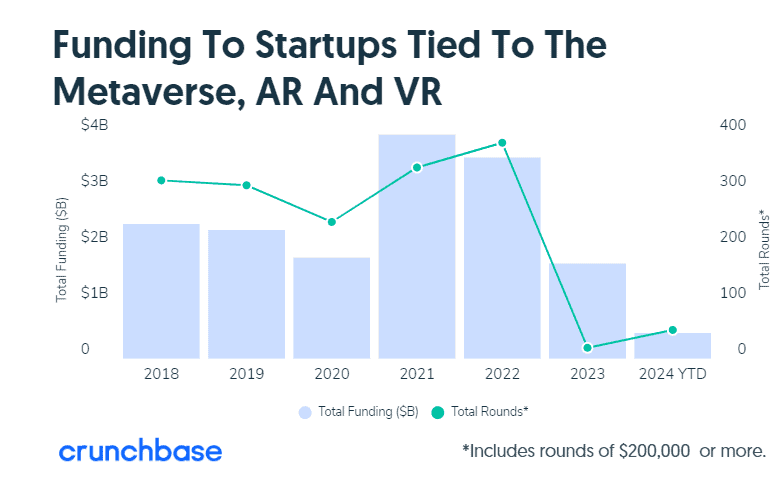

The term "Metaverse" has been buzzing around the media for some time now, promising a revolutionary new way of interacting on the Internet. But what exactly is it and what is the current state of the metaverse? In this updated article, we shed light on the current developments, challenges and future potential of this virtual world.
The metaverse is used as a synonym for XR Technologies used in general. However, the metaverse concept was primarily coined by Mark Zuckerberg in its use in the media.
Mark Zuckerberg introduces the idea of the Metaverse in his 2021 keynote speech and thus starts the hype.
Many of the concepts that Mark Zuckerberg promised in 2021 have not yet been realized.
Has the hype died down?
While large tech companies such as Meta (formerly Facebook) made massive investments in the metaverse in 2021 and early 2022, triggering a boom, the euphoria seems to have subsided somewhat. Venture capital investments in metaverse start-ups fell significantly in the first quarter of 2024.

The chart above shows the significant decline in investments in the Metaverse segment
In addition to waning investment interest, there are other hurdles that are slowing down the mass market launch of the metaver:
The hardware required, such as VR goggles and powerful computers, is still too expensive and inaccessible for many users.
However, Meta is continuously working on low-cost hardware solutions in the €300 range. Apple, on the other hand, is focusing on a device in the €4000 price segment with the Vision Pro. However, it doesn't look like Apple will be able to attract many customers to this rather expensive piece of hardware.
There is not one metaverse of linked immersive applications. The different metaverse platforms are currently not compatible or linked, which fragments the user experience and makes scaling difficult.
Concerns about data protection and security in the Metaverse remain high and must be addressed in order to gain trust.
A profitable business model for the metaverse has not yet been clearly defined. How exactly companies and users can generate value in this virtual world remains to be seen. Many forecasts regarding the monetization of the metaverse appear quite optimistic in retrospect.
Experts also express doubts about the usefulness of some of the use cases promoted by Meta in the metaverse. Virtual meetings and working in the metaverse could be inefficient and impractical.
Also the initial enthusiasm for game currencies, Non-Fungible Tokens (NFTs) and virtual real estate in the metaverse seems to be waning. These use cases are considered unrealistic and of little value by many experts. The concept of combining the metaverse and crypto has hardly been discussed recently. Critics have always been of the opinion that this connection was just the linking of two buzzwords to inspire investors. Meta no longer talks about NFTs at all.
Apple, with its XR glasses Apple Vision Pro, focuses on the integration of digital content into the real environment (AR) and distances itself from the term "metaverse". However, despite the verbal focus on the term "metaverse", the Apple Vision Pro "Spatial Computing" not a big seller either.
Despite these challenges, there are also positive developments:
Improved technology:
The hardware is continuously being developed and made more affordable. VR glasses are becoming lighter, more comfortable and more powerful.
This is important because poor image quality, ergonomics and the high price are factors that many VR users find unattractive.
Platforms and applications:
New metaverse platforms and applications are constantly being developed that expand the possibilities and areas of application.
Commitment of large companies:
Large tech groups and companies from various sectors continued to invest in the metaverse, but it remains to be seen whether these companies will hold on to their investments in the metaverse after the hype.
Everything bad in the Metaverse?
The metaverse is still a long way from the idea propagated by Mark Zuckerberg that we will all work and meet friends in the metaverse. However, there are other much more tangible use cases for XR technologies that are much more promising.
In some areas, such as gaming and virtual training, we are already seeing initial successes and use cases with real added value.
The metaverse is still at an early stage of development and it is unclear whether and how quickly it will develop into a mass market. The technical challenges, fragmentation of the landscape, scepticism towards certain use cases and questions about monetization and data protection are serious hurdles.
Nevertheless, the potential for innovation and new forms of interaction, collaboration and creativity in various areas is enormous. We are firmly convinced of the enormous potential of XR technologies. However, Meta and Mark Zuckerberg's vision of the future seems rather utopian to me. The technology is simply not that advanced yet.
It will be interesting to see how the metaverse develops over the next few years.

Are you interested in developing a virtual reality or 360° application? You may still have questions about budget and implementation. Feel free to contact me.
I am looking forward to you
Clarence Dadson CEO Design4real